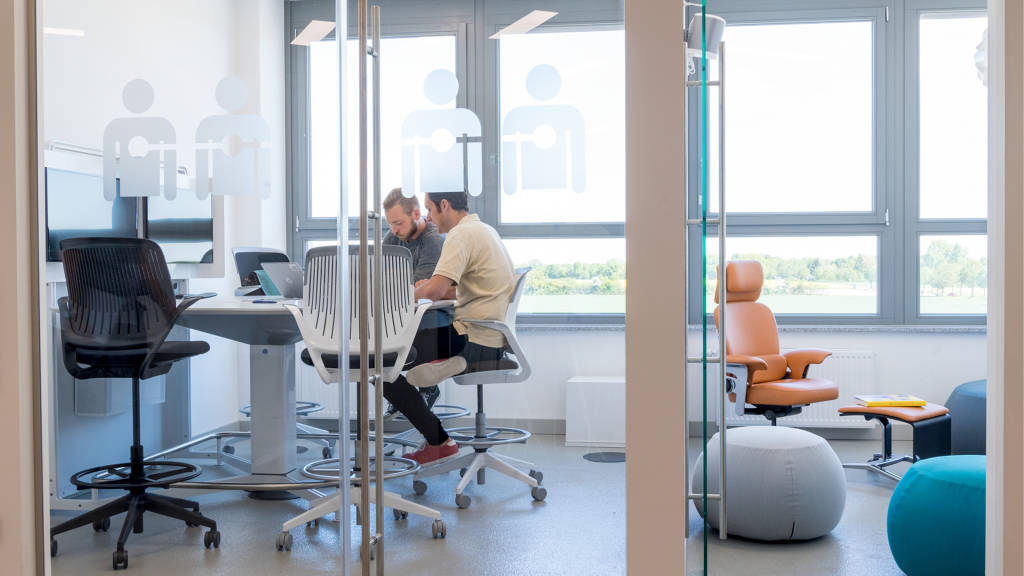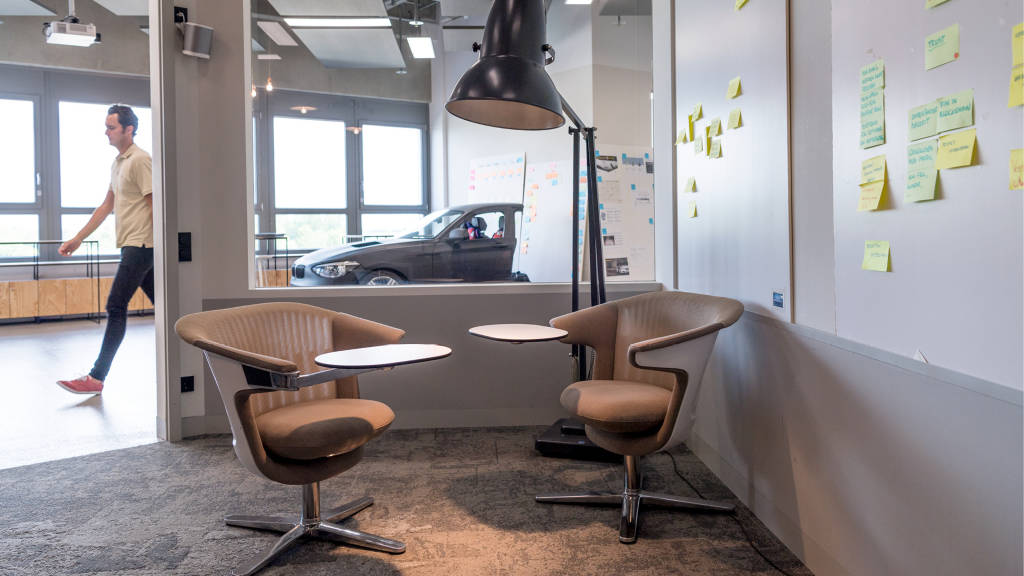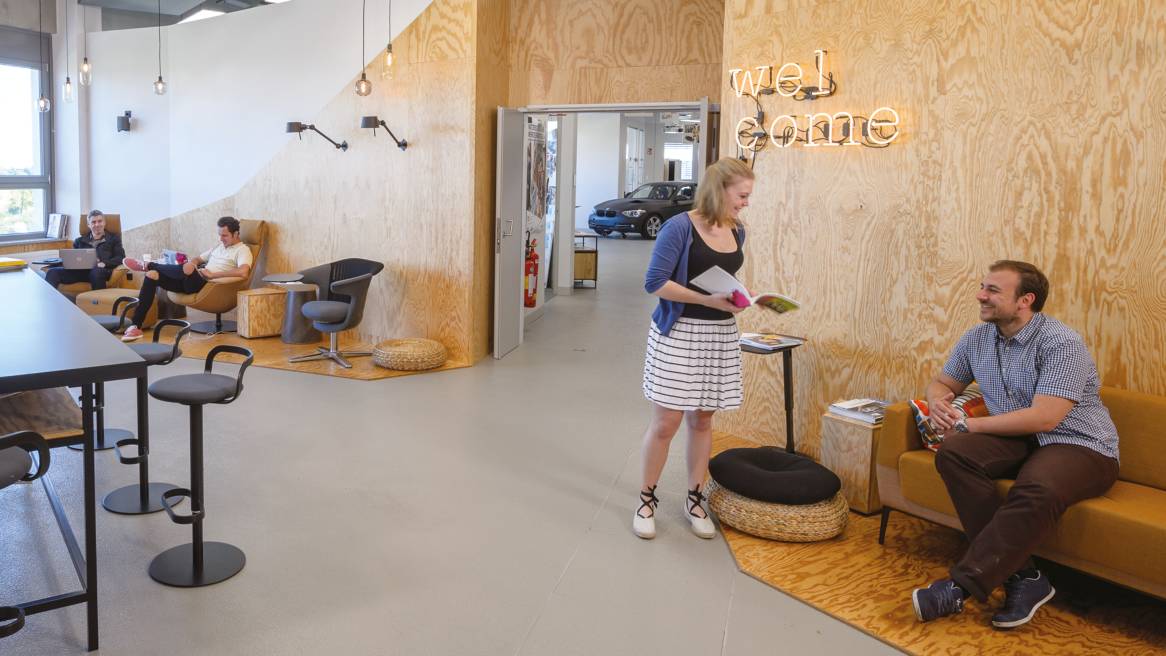How BMW Is Driving Innovation
As the world’s best-selling manufacturer of luxury cars, creativity has been important to the success of the BMW Group. A century-old company, it has achieved an impressive tradition of innovation.
Now, however, as a tidal wave of change is sweeping through its industry, the need for rapid innovation at BMW has become more urgent than ever before. For example, as a result of autonomous driving, they expect their business to change more over the next decade than it has during the past 30 years. The escalating reality of cars without a human driver means coming to terms with new customer habits and expectations, changing global markets and all-new competitors as tech companies foray into their industry.
To stay ahead, BMW realized the importance of accelerating its innovation process into a more systematic approach, and they also quickly understood that the workplace could play a pivotal role in that effort.
The BMW Innovationswerk facility, in a suburb just north of the Munich headquarters, is a new center where innovations and new technologies can occur in a novel way. With the help of their design partner for spatial strategies Die Planstelle, Steelcase and IDEO, it was purposefully planned for cross-functional teams doing forward-facing explorations into the cars of the future. Here, the essential modes of creative work — focusing, collaborating, socializing and respite – are optimally supported.
“We wanted to create a special place to innovate with users at the center to support the process. And this is exactly what the space does,” says Sebastian Schelper, who headed the Innovationswerk project for the BMW Group from 2013 till 2016.

A Human Place
According to Schelper, to reinforce the importance of fluid thinking, there are no right-angle walls anywhere at Innovationswerk. Natural materials such as wood walls blend with industrial surfaces such as concrete floors. The furniture was carefully chosen to add stimulating color and texture. Most important, Innovationswerk was designed to holistically support the creative process across the full spectrum of their workplace needs. “It’s a human place,” is Schelper’s simplest explanation for why Innovationswerk works so well.
The heart of the facility is three large enclosed team rooms. They are the primary workspaces for teams that iterate a project over several months or up to a year. Integrated large-scale boards provide persistent visibility for photos, notes, sketches, reactions and ideas – a wealth of informational and inspirational content gained during primary observational research. The boards become a tangible, immersive context for the work of the team. They also serve as an interactive canvas where the teams can synthesize diverse streams of information into actionable opportunities.
Nearby, a small “tinker lab” allows teams to quickly prototype their concepts, and a videoconferencing room means they can easily connect with people outside the facility to collaborate and gain expertise.
“We wanted to create a special place to innovate with users at the center to support the process. And this is exactly what the space does,”
Sebastian SchelperHead of Innovationswerk project, BMW
SUPPORTING I & WE
Just outside the team rooms is a large open area where smaller groups can break away to focus on specific problems. Alternatively, an entire team can use this space as a secondary focus area if the scope of their work has outgrown their room, or if they want to put their work in a different context to gain a different perspective. There’s plenty of room for prototypes here—even an entire car can be driven into the space.
A much smaller space that’s equally important to the creative process is an enclosed meditation room offering inspiring views of nearby trees and fields. “When you’re dealing with so much information, it’s easy to feel overwhelmed,” explains Schelper. “You can go into the meditation room to take a break, center your thoughts or get connected with your intuition. You can even take a nap here. It’s part of the whole ecosystem of spaces that support people’s needs.”

Near the entrance is an open kitchen and lounge area. This is a place for informal collaboration and socializing, with teammates as well as colleagues from BMW Munich locations who use Innovationswerk as an occasional drop-in workspace. In this way, the facility is “a unique magnet,” says Schelper, where serendipitous interactions often result in gaining useful knowledge and perspectives.
As important as each of the Innovationswerk spaces is to the process of creative work, it’s their immediate adjacencies that assure a holistic solution. When spaces are too far away from each other, Schelper notes, they don’t get used often. As a result, some important aspects of creative work are underserved. Nurturing creative work means supporting a multiplicity of thinking modes and needs, without prioritizing one over another.
“A key thing I’ve learned from this project is that creativity is really a combination of analytical pondering of a problem as well as letting your inspiration and intuition flow,” Schelper concludes. “It’s the combination of both that is facilitated by this space and makes it a success.”


